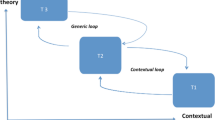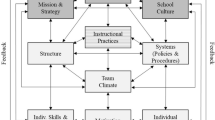Abstract
The authors argue that the knowledge work metaphor is the most powerful image of schools for understanding reform. Using themes from the new management literature, such as shared decision making, collegiality, innovation, and experimentation, as additional guides for school improvement, the authors develop a case for systemic reform based on the professionalization of teaching and the integration of theory, research, and practice, Finally, transformational leadership is presented as the key to facilitating systemic reform.
Similar content being viewed by others
References
Abramson, M. A. (1985). The public manager and excellence.The Bureaucrat: The Journal for Public Managers Fall, 9–13.
Berliner, D. (1983). Executive functions of teaching.Instructor Sept., 18–33, 36, 38, 40.
Burns, J.M. (1978).Leadership. New York: Harper & Row.
Clifford, D. K., and Cavanagh, R. E. (1986). Attending to smallest details makes winner. From D. K. Clifford and R. E. Cavanagh,The Winning Performance, The Courier-Journal 2, E1, 10.
Coalition of Essential Schools. (1985).Prospectus. Providence, R.I.: Brown University.
Covey, S. R. (1985). A state of excellence. Teleconference lecture. Salt Lake City, Utah, September 17.
Deal, T. E., and Kennedy, A. A. (1982).Corporate Cultures: The Rites and Rituals of Corporate Life. Reading, Mass.: Addison-Wesley.
Donnelly, J. F. (1977). Participative management at work: An interview with John F. Donnelly.Harvard Business Review Jan.–Feb., 117–127.
Drucker, P. (1973).Management: Tasks, Responsibilities, Practices. New York: Harper and Row.
Drucker, P. F. (1985).Innovation and Entrepreneurship: Practices and Principles. New York: Harper and Row.
Grove, A. S. (1983).High Output Management. New York: Random House.
Harrison, R. (1972). Understanding your organization's character.Harvard Business Review May–June, 119–128.
Hovada, R. A., and Kyle, D. W. (1983). Implementing action research in a graduate teacher education program. Paper presented at the annual meeting of the American Educational Research Association, Montreal, April.
Jackson, P. W. (1968)Life in Classrooms. New York: Holt, Rinehart and Winston.
Katz, R. L. (1974). Skills of an effective administrator.Harvard Business Review Sept.–Oct., 90–102.
Kotter, J. P. (1982). What effective general managers really do.Harvard Business Review Nov.–Dec. 156–157.
Kyle, D. W., Hovda, R. A., and Whitford, B. L. (Forthcoming). Action research for teachers: A reflective dialogue. InTeaching Education. Columbia: University of South Carolina.
Leavitt, H. J. (1985).Corporate Pathfinders: Building Vision and Values into Organizations. Dow Jones.
Levinson, H. (1980). Criteria for choosing chief executives.Harvard Business Review July–Aug., 113–120.
Little, J. W. (1981).School Success and Staff Development. Boulder, Colo.: Center for Action Research.
McClelland, D. C., and Burnham, D. H. (1976). Power is the great motivator.Harvard Business Review March–Apr., 100–110.
Mintzberg, H. (1975). The manager's job: Folklore and fact.Harvard Business Review July–Aug., 49–61.
Nixon, J. (1981).A Teacher's Guide to Action Research. London: Grant McIntyre.
Noblit, G. W. (1985). What's missing from the national agenda for school reform: Teacher professionalism and local initiative. Paper prepared for the American Educational Studies Association Annual Meeting, November.
Peters, T., and Austin, N. (1985).A Passion for Excellence: The Leadership Difference. New York: Random House.
Rodgers, F. G. (1986).The IBM Way. New York: Harper and Row.
Schlechty, P. C. (1976).Teaching and Social Behavior: Toward an Organizational Theory of Instruction. Boston: Allyn & Bacon.
Schlechty, P. C. (1984). Restructuring the teaching occupation: A proposal. Paper commissioned by the American Educational Research Association.
Schlechty, P. C. (1985). District level policies and practices: Supporting effective school management and classroom instruction. In R. J. J. Kyle (ed.),Reaching for Excellence: An Effective Schools Handbook. Washington, D.C.: National Institute of Education.
Schlechty, P. C. (1986). Personal communication.
Schlechty, P. C., and Crowell, D. (1983).Understanding and Managing Staff Development in an Urban School System. Final report to the National Institute of Education (400-79-0056). Washington, D.C.
Schlechty, P. C., and Joslin, A. W. (1984). Images of schools.Teachers College Record 86(1): 156–170.
Schlechty, P. C., and Noblit, G. W. (1985). Using a focus on new teachers to develop experienced staff: The Durham County, N.C. Case. Unpublished manuscript.
Schlechty, P. C., and Vance, V. S. (1983). Recruitment, selection, and retention: The shape of the teaching force.The Elementary School Journal 83: 469–487.
Schlechty, P. C., and Whitford, B. L. (1983). The organizational context of school systems and the functions of staff development. In G. A. Griffin (ed.),Staff Development: Eighty-Second Yearbook of the National Society for the Study of Education (Part II). Chicago: University of Chicago Press.
Schlechty, P. C., and Whitford, B. L. (In press). Public school and teacher education reform: A proposal for shared action. In E. Galumbus (ed.),Improving Teacher Education. San Francisco: Jossey-Bass.
Schlechty, P. C., George, J. R., and Whitford, B. L. (1978). Reform in teacher education and the professionalization of teaching.The High School Journal 61(7): 313–320.
Tannenbaum, R., and Schmidt, W. H. (1973). How to chcose a leadership pattern.Harvard Business Review May–June, 162–172.
Teacher Development in Schools. (1985). New York: Academy for Educational Development.
Tikunoff, W. J., and Mergendoller, J. R. (1983). Inquiry as a means of professional growth: The teacher as researcher. In G. A. Griffin (ed.),Staff Development: Eighty-Second Yearbook of the National Society for the Study of Education (Part 2). Chicago: University of Chicago Press.
Tikunoff, W. J., and Ward, B. A. (1983). Collaborative research on teaching.The Elementary School Journal 83(4): 453–468.
Toffler, A. (1985).The Adaptive Corporation. New York: McGraw-Hill.
Uttal, B. (1983). The corporate culture vultures.Fortune Magazine Oct. 17, 34–40.
Whitford, B. L. (1984). Some structural constraints affecting action research.The High School Journal 68(1): 18–24.
Whitford, B. L., and Kyle, D. W. (1984). Interdisciplinary teaming: Initiating change in a middle school. Paper presented at the Annual Meeting of the American Educational Research Association, New Orleans.
Author information
Authors and Affiliations
Rights and permissions
About this article
Cite this article
Whitford, B.L., Hovda, R.A. Schools as knowledge work organizations: Perspectives and implications from the new management literature. Urban Rev 18, 52–70 (1986). https://doi.org/10.1007/BF01112123
Issue Date:
DOI: https://doi.org/10.1007/BF01112123




